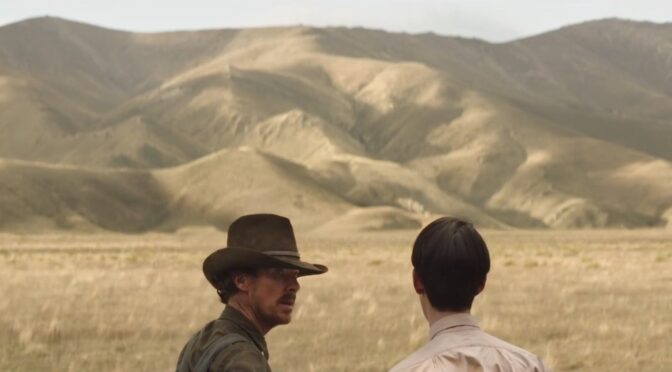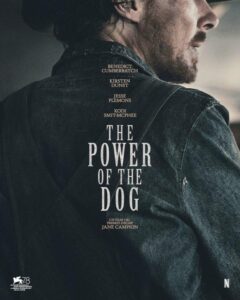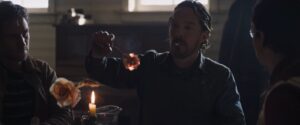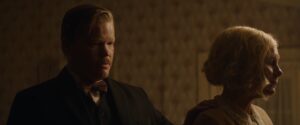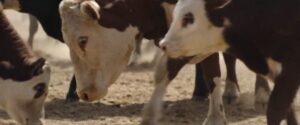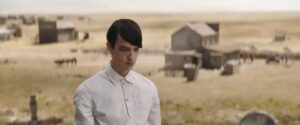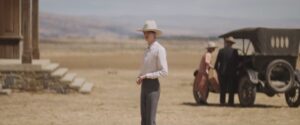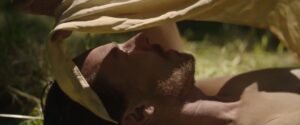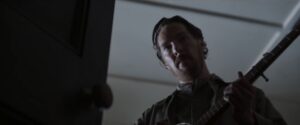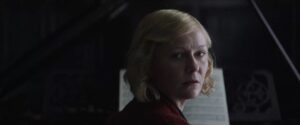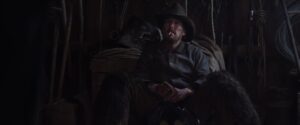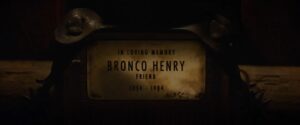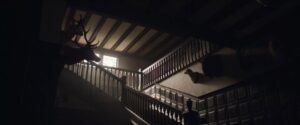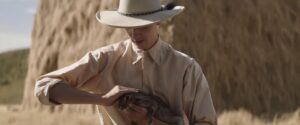I promise to form a few thoughts of my own in this, my review of Jane Campion’s Best Director-winning The Power of the Dog. But has anyone tapped more succinctly and perfectly into the nature of this transfixing slowburn masterpiece than dear old Martin Scorsese? At the New York Film Critics Circle awards dinner, the invaluable, film-loving genius started his adoring speech with two questions. “What is strength and who is the strongest?” It’s an area Scorsese knows something about. The director of Raging Bull, Taxi Driver and Goodfellas has spent a career digging into toxic masculinity, examining men whose tendencies toward violence, abuse and self-serving greed mark them not as the strong alpha males they want to be, but as feeble, stunted and soul-sick. It is not only a perfect starting place for The Power of the Dog, but for Campion’s own rich and enigmatic filmography. Campion details the female journey through worlds overseen and dominated by conceited, insecure and possessive men. Holly Hunter’s Ada in The Piano is a mute woman sold into an arranged marriage with Sam Neill’s controlling land-owner. She seems to be literally without voice or power and then her petty husband asserts control over her further by refusing to keep her beloved musical instrument (her one real mode of expression) in his house. In Bright Star, Abby Cornish’s Fanny is repeatedly disrespected as a tiresome nuisance by her paramour’s jealous friend. Great New Zealand author Janet Frame loses eight years in the patriarchal maze of the asylums in An Angel At My Table. Campion’s women are among the most complex, human characters put to screen and they are invariably the strongest people in their own stories, despite having to jockey with men who try to break them in like wild colts. Campion’s wild and passionate women are not demure, but they also do not win their freedom and respect by conforming to the aggressive male traits they rebel against. I would call their perseverance feminine, though perhaps Campion would resist gendering it at all. Campion women retain the ineffable, mysterious essence of who they are. But one thing is true of strength in her films. It is a thing kept inside and it is not easily defined or pigeon-holed.
The first of our four main characters we hear from is the teenaged Peter, though only briefly and offscreen. The soft-spoken, effeminate boy is the youngest and seemingly frailest of the bunch. Nonetheless, his words, softly spoken in voiceover over a black background, are chosen to start the film. He speaks of his recently widowed mother and a need to keep her safe. “For what kind of man would I be,” he asks, “if I did not help my mother?” The year is 1925, the setting is Montana (played by the rugged hills of Campion’s native New Zealand), and two ranch-owning brothers are about to go on their last cattle drive together. It is also the 25th anniversary of their start in the cattle ranching business. One brother, Phil Burbank (Benedict Cumberbatch, giving his first full-stop brilliant performance), sees this as a poignant and momentous occasion, the end of a very special partnership. He keeps looking to his brother, George, to validate that sentiment, though his manner of getting attention (mostly by barking and calling him Fatso) is clearly backfiring. George Burbank (a lovely Jesse Plemmons, the very picture of subdued decency) is a brick wall, though we pick up that he may be looking forward to working less closely with his irately domineering brother. He certainly does not seem to attach any strong emotions to this last ride down the trail. George’s taciturn manner only seems to fuel Phil’s never-ending cycle of putdowns and childish neediness. The end of their road (them and a gaggle of younger cowboys) is the small town of Herndon, where the dirt-caked men will enjoy a celebratory fried chicken dinner, drunkenly dance and carouse (though Phil never seems to gravitate to any of the saloon’s willing women), and have a good sleep in a real 1920s hotel bed. The owner of the hotel is Rose (Kirsten Dunst, heartbreakingly vulnerable), a recent widow – a “suicide widow” as Phil cruelly puts it – who runs it with her unguardedly feminine 18-year old son Peter (a spellbindingly complex turn from Aussie up-and-comer Kodi Smit-McPhee). We first see Peter alone in his room making elaborate flower arrangements out of magazine paper to stand in for the ones that are hard to come by in this arid cowtown. He places a few on his father’s grave and uses the rest to decorate the restaurant’s dining tables. When Peter comes to wait on Phil’s table, Phil mocks his lisp and uses one of his artificial blooms to light a cigarette. He very transparently does this at the exact moment Peter is watching. Phil’s act of cruelty comes back to haunt him when George goes back into the kitchen to pay the bill and finds Rose weeping. No stranger to Phil’s bullying himself, George feels a duty to comfort Rose. He even comes back some days later to help her serve food. In a matter of weeks, the two will be married (Plemmons and Dunst are husband and wife in real life), much to Phil’s angry, misogynistic disapproval, and Rose will live under Phil and George’s roof. With George getting out of the cattle business and into bigger things, and Peter off at his first year of medical school for a full third of the picture, Rose now has to spend her every waking moment alone with a mean-spirited bully who terrorizes her with alternating waves of vindictive mockery and frigid disregard. When Peter finally comes to spend his summer break at the Burbank ranch, he finds his already meek mother a pale shell of herself and deep into drinking herself to death. The Power of the Dog is a mystery thriller about what will happen to Peter, Phil and Rose (straight, heterosexual George will be just fine), as this toxic dynamic comes to a head. It is also interested in what motivates Phil Burbank’s unrelenting animosity.
The great power in a film like this is in its ability to patiently tease out the important details of its plot and its characters. It builds suspensefully and methodically, doling out information at the time we need it. But if one thing feels apparent from the start, it’s that something in the feminine, seemingly open book of Peter stirs up something combustible in Phil. His jockish ridicule is not a million miles removed from the way certain straight men have bullied gay men throughout history and that gives Phil all the plausible deniability he needs. He has an excuse to fixate on a guileless, barely of age twink he has only just met for the better part of an evening until it drives poor Rose to tears within minutes (a first impression of Phil that time will prove correct). It’s the 1920s and all Phil has to say is that he was teaching a naive homosexual what the tough old world will do to him if he continues to reveal himself so unashamedly to strangers. And yet, there is just something too obsessive and eager in Phil’s attentions toward Peter. As openly antagonistic as they are, they also have an unmistakable tone of wounded neediness. Campion has crafted a film in dialogue with Ang Lee’s queer landmark Brokeback Mountain in how it presents Western tropes as being loaded with domination and hypermasculinity, while also seeing something tender and anguished beneath all the machismo. The film is based on the 1967 novel by queer author Thomas Savage, who took inspiration from his own experience coming of age on his stepfather’s cattle ranch after his own mother was widowed. It would be easy to say that Peter is fully Savage’s surrogate and yet Savage would not fully open up about his sexuality (he had a 50-year marriage to a woman, a fellow writer) for several decades. Peter, by contrast, seems like he’s never hidden that part of himself for a minute of his life. Without saying too much, there is more to the queerness of the story than just Peter. This would not be the phenomenal mystery box of sexuality and identity that it is if the only non-straight character were the one completely honest and upfront about it. The beauty of the film is how it locates its queer themes in a landscape and a lifestyle that seems anathema to queer identity. The cowhands laugh at Peter and make their horses rear up to scare him when he first arrives. And yet these same alpha men are themselves very uninhibited. They are unashamed to splash about naked in the rivers and sunbathe together. Campion is not entirely denying Phil’s tirade about the danger of being openly gay at this time. But on the other hand, she delights in showing how much appeal cowboy culture’s rule-free, unshackled, theatrically rough vibe might hold for a man who pines for the company of other men.
Campion is fascinated by human contradictions and by the veil between authenticity and performance. In one one scene from her masterpiece The Piano, a group of Maori tribesmen storm the stage at a local play because they think the silhouette of a villain threatening some women is an actual killer on the loose. There are no stage actors in The Power of the Dog, but Campion reveals layer by layer how much of Phil’s homophobic, ornery, grimy (his refusal to bathe for a dinner with the Governor of Montana feels like the petulant tantrum of a four-year old) persona is all an elaborate act of dress-up. The tenuous border between truth and playacting is still present in Campion’s vision of the West, just as it was in the misty wilds of New Zealand. Phil isolates from the high-minded, elbow-rubbing sort of company his brother wants to cultivate, but we come to see these socialites are much more his natural fellows than the free-roaming hayseeds who work for him. In stark contrast to Phil’s plain-spoken blue collar character, the Governor remembers Phil as a one-time Ivy League student who majored in dead languages. Somewhere beneath the stinky, muddy costume Phil dons each day are the remains of a hyperliterate intellectual. And we can see from the first moment we meet him that Phil is wealthy. He and his brother live in a mansion with servants and cowhands. Getting up on a horse and tanning leather and castrating bulls isn’t even something he needs to do. The politician regards Phil’s crass affectations as an unwashed cattle rustler with unconvinced bemusement. “So he swears at the cattle in Greek or Latin?,” the perceptive Governor wryly asks George. But I don’t think Campion or Savage mean to entirely demean Phil for his histrionic, tough guy posturing. We all have the right to create an image for ourselves that fits who we are better than the one we are born with. And Phil has clearly found no joy in the life of a rich landowner and cattle magnate, though he clearly is one. Maybe it’s just that the more Phil talks tough, the less convincing he really seems. Apart from poor, fragile Rose, nobody really ever seems rattled or afraid of his grandstanding meanness. Annoyed or weary of it, perhaps. We can sense that the first time we see George tune his brother out on their last ride. George is wise enough to pull away from Phil, so secretly relieved to finally break their bond that he literally weeps for joy when he and Rose are finally married. The problem is that, with the entrance of Rose, Phil finally finds someone he can truly hurt, even destroy. And that development means that Phil does become more than just a paper tiger, more than just a sad, volatile, mean-spirited little man. For as much as we come to feel for Phil Burbank and the real life he believes he can never have, he is also a mad dog in this story. The blustery masquerade he has been performing suddenly becomes as real as he always wanted it to be. Phil gets the chance to do more than just fashion himself as a swaggering brute. He becomes an actual monster. And that brings consequences that the one-time Latin scholar fails to recognize.
None of Phil’s vileness detracts from the scale of his tragedy. It magnifies it. Many of the most heartbreaking characters throughout history are monsters. One of the motifs in The Power of the Dog is the pairing of characters. For it is a story, as George tearfully puts it to Rose, about how nice it is to not be alone. When the film begins, Phil is already losing George (his bullying likely drove him away ages ago). Then George finds a wife and becomes part of a truly healthy pair. Rose and Peter are another pair. They have each other’s backs with a tender, fierce resolve that Phil is blind to. He is too spiteful of all things soft to recognize the strength of these bonds. Or maybe he self-destructively spits in the face of all that due to the loss of the person who meant the most to him. An older mentor named Bronco Henry once taught Phil everything he knows about ranch life and even saved his life in a blizzard. He helped the brothers start their business. When George balks at toasting to Bronco Henry at that farewell fried chicken dinner, Phil shows that maybe he does understand the value of kinship, of letting someone in. “People helped you, Fatso,” he snarls, the empathetic wisdom of his words curdled, as always, with abrasive cruelty. Bronco Henry died many years ago, leaving only the saddle that Phil tenderly keeps and maintains in the barn. Phil is alone and initially seems determined to stay that way for the rest of his miserable days. Until one day, when Peter is spending his last weeks at the ranch before returning to university, some patch of ice thaws. Phil unexpectedly apologizes to Peter about starting off badly with him. He talks of them one day becoming good friends. He takes Peter under his wing and teaches him to ride and pours his energies into braiding a rope for him to take back to school with him. Those scenes have a tone that is both poignant and also tremendously unnerving. Not because we do not buy Phil’s newfound affection for Peter, not because Phil’s sudden compassion is necessarily counterfeit. But because, in desperately grasping for a bond with Peter, Phil is weaning him away from the desperate, deteriorating Rose. And because Peter now has to reconcile two poles: a fond friendship with a man more like himself than he first thought and the monstrous animosity that same man shows toward his mother. Phil seems to believe he has found something deeper than friendship with Peter. Possibly love and at least the chance to share more deeply of himself than he has in decades. Peter sees that he may not be able to have both Phil’s companionship and his beloved mother. Someone will have to lose. And nobody wants to be alone, but maybe enough trauma and misfortune and bad decisions casts that die for us. Maybe those who commit to a path of being unknowable and abusing others don’t get the luxury of connecting with the very humanity they have shunned. Even if that one little connection may be their only hope of redemption and self-preservation.
And while Campion is a master at ruminating on these heady, soulful matters of longing, masculinity, femininity, and soul-sickness, The Power of the Dog is too taut to be categorized entirely as a tone poem. I suppose it resists that easy categorization in a very Campion way. The Neat trick is realizing what a tightly wound watch it is. It is the kind of film that, on first viewing, feels more languid and meditative than it is. On a rewatch, I saw fateful decisions, dialogue and character reveals happening for the entire runtime; pulling together slowly but surely like the knots in Phil’s braided rope. Of all the mood pieces to accuse of being sedate, I am surprised that this one has attracted such a vocal band of detractors. For me, The Power of the Dog splits the difference between a tone poem and something akin to a great episode of The Twilight Zone. Not that there are any sci-fi elements, but that there is a twisty, punchy, satisfying little morality play nestled at the heart of it. It’s one of the only films I can think of whose sense of storytelling can be described as both lush and sinewy, dreamy and muscular. And being able to really see the shape of it makes revisiting it even richer than discovering it for the first time. It grows in pathos when we have learned all the choices its characters will make. And what seemed like small details take on the weight of tragedy. Phil and Peter’s first meeting and the power dynamic between them. The way Phil clumsily caresses the inside of a paper flower he will later destroy. A rabbit Peter captures and hot it reveals a new, surprising side of his nature. How the mostly sweet George obliviously alienates Rose in favor of his work, creates a rupture in the film’s pairing motif, and pushes the plot fatefully forward. An anthrax outbreak at the ranch. The cowhides Phil refuses to sell just so he can burn them. Phil’s need to burn through everything and everyone. His need to appear tough in his work, even if it’s all just for pointless show. Even if it’s liable to get him hurt. A rope and how very much it can symbolize. Ties of love and friendship. But also bondage, domination and power. What is power and who wields it? What does real power look like? Is it the horse whinnying and bucking or the rabbit hiding and planning its next move for survival? What is strength and who is the strongest? Campion’s way is not to offer up any readymade answer but to open our minds to the idea that strength is a nebulous thing. A fluid and situational thing. A shapeshifter whose true nature is fleetingly glimpsed and only with the right kind of eyes.
